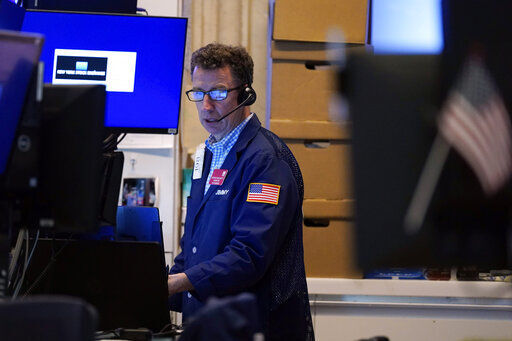NEW YORK — Stocks are falling sharply today as worries sweep from Wall Street to Sydney that the worsening pandemic in hotspots around the world will derail what’s been a strong economic recovery.
The S&P 500 was 1.9% lower in morning trading, after setting a record high just a week earlier. In another sign of worry, the yield on the 10-year Treasury dropped close to its lowest level in five months. It sank below 1.20% as investors scrambled for safer places to put their money.
The Dow Jones Industrial Average was down 769 points, or 2.2%, at 33,918, as of 9:17 a.m. Central time. The Nasdaq composite was 1.7% lower.
Airlines, hotels and stocks of other companies that would get hurt the most by potential COVID-19 restrictions were taking some of the heaviest losses, similar to the early days of the pandemic in February and March 2020. Mall owner Simon Property Group tumbled 7.8%, and cruise operator Carnival lost 7.5%.
The drop also circled the world, with several European markets down nearly 3%, on worries new, more infectious variants of the virus are dragging particularly hard on economies where vaccination rates are low. The price of benchmark U.S. crude, meanwhile, sank more than 5% after OPEC and allied nations agreed on Sunday to eventually allow for higher oil production this year.
Experts are saying Indonesia has become a new epicenter for the pandemic as outbreaks worsen across Southeast Asia. Meanwhile, some athletes have tested positive for COVID at Tokyo’s Olympic Village, with the Games due to open Friday.
“The more transmissible delta variant is delaying the recovery for the ASEAN economies and pushing them further into the doldrums,” said Venkateswaran Lavanya, at Mizuho Bank in Singapore.
Even though vaccination rates are higher in the United States and some other developed economies, the tightly connected global economy means hits anywhere can quickly affect others on the other side of the world.
In Japan, the world’s third-largest economy, the vaccine rollout came later than in other developed nations and has stagnated lately. Japan is totally dependent so far on imported vaccines, and just one in five Japanese have been fully vaccinated.
Financial markets have been showing signs of increased concerns for a while, but the U.S. stock market had remained largely resilient. The S&P 500 has had just two down weeks in the last eight.
The bond market has been louder in its warnings, though. The yield on the 10-year Treasury tends to move with expectations for economic growth and for inflation, and it has been sinking from a perch of roughly 1.75% in March. It was at 1.19% this morning, down from 1.29% late Friday.
Analysts and professional investors say a long list of reasons is potentially behind the sharp moves in the bond market, which is seen as more rational and sober than the stock market. But at the heart is the risk the economy may be set to slow sharply from its current, extremely high growth.
Besides the new variants of the coronavirus, other risks to the economy include fading pandemic relief efforts from the U.S. government and a Federal Reserve that looks set to begin paring back its assistance for markets later this year.
Worries about a possible sharp slowdown have particularly hurt stocks whose profits are most closely tied to the strength of the economy. Stocks of smaller companies, for example, have been scuffling since hitting a peak in March even though many reports on the economy still show it’s growing at a very healthy rate.
The Russell 2000 index of smaller stocks slumped 2.3% today, outpacing losses for their larger rivals on Wall Street.
The selling pressure was widespread, with more than 90% of the stocks in the S&P 500 lower. Even Big Tech stocks were falling, with Apple down 3.1% and Mircrosoft 1.5% lower. During earlier hiccups for the stock market, investors would often big up such stocks further on expectations they will continue to grow almost regardless of the economy’s strength.
Among the few gainers on Wall Street were potential winners of a return to a stay-at-home economy. Clorox rose 1.2%, and Campbell Soup gained 1%.
In Europe, Germany’s DAX lost 2.9%, and France’s CAC 40 fell 2.9%. The FTSE 100 in London slumped 2.6%.
In Asia, Japan’s Nikkei 225 lost 1.3%, Hong Kong’s Hang Seng fell 1.8%, South Korea’s Kospi dropped 1%. Australian stocks sank 0.9%.


